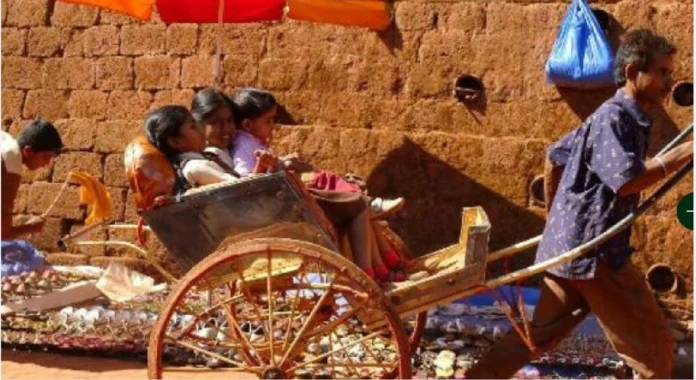By Binny Yadav
In the opening scenes of the 1953 classic, the camera follows Shambhu, played by Balraj Sahni—once a proud farmer—now hunched over the wooden shafts of a hand-pulled rickshaw in Kolkata’s teeming streets. His bare feet slap against the scorching road. His lungs gasp for air as the weight behind him tugs at his shoulders. The rickshaw jolts forward, but it is Shambhu’s dignity that is being dragged through the dust.
Seven decades later, that image is no longer confined to black-and-white cinema. It has lived on in India’s hill stations and narrow lanes—until last month, when the Supreme Court struck a decisive blow against the practice in the ecologically sensitive town of Matheran, near Mumbai.
Declaring it “against the basic concept of human dignity,” a bench of Chief Justice BR Gavai and Justices K Vinod Chandran and NV Anjaria ordered a complete ban on hand-pulled rickshaws. The Court emphasised that no one engages in this work by free will, but out of sheer lack of choice—placing it firmly within the ambit of forced labour under Article 23 of the Constitution.
COLONIAL CHAINS ON WHEELS
Hand-pulled rickshaws first appeared in India in the late 19th century, imported to Kolkata by British colonialists after their use in Japan. Initially a novelty for transporting the elite through congested streets, they became a grim emblem of colonial hierarchies—one human being physically hauling another under the burning sun or monsoon rain.
The work drew in migrants from impoverished districts, whose only asset was their own labouring bodies. Independence in 1947 did not end the practice. While some cities moved to mechanised or cycle rickshaws, hill towns like Matheran clung to it, framing it as “tradition” or “tourist charm”.
THE CONSTITUTIONAL BEDROCK: ARTICLE 23 AND THE RIGHT TO DIGNITY
The bench rooted its decision in Article 23, which prohibits begar (compulsory labour) and all forms of forced labour. In the People’s Union for Democratic Rights vs Union of India (1982)—the Asiad Workers Case—the Court had made clear that even paid work could be forced labour if economic compulsion removed genuine choice.
By invoking this precedent, the Matheran judgment reaffirmed that constitutional guarantees are not symbolic—they are enforceable shields against exploitation, even when wages are paid.
A HISTORY OF JUDICIAL INTERVENTION
The verdict drew on earlier cases that expanded the constitutional vision of dignity:
- Azad Rickshaw Pullers Union vs State of Punjab (1980): Addressed rehabilitation and ownership rights for cycle rickshaw pullers.
- Bandhua Mukti Morcha vs Union of India (1984): Linked Article 21’s right to life with the right to be free from exploitative labour.
- Sanjit Roy vs State of Rajasthan (1983): Held that paying below minimum wage is forced labour.
- Neeraja Chaudhary vs State of MP (1984): Stressed rehabilitation as a state obligation, not charity.
These precedents form a jurisprudential arc: human dignity is not an abstract ideal—it is a binding constitutional guarantee.
FROM CINEMATIC SYMBOLISM TO LEGAL REALITY
If Do Bigha Zameen invited empathy for the crushing weight of poverty, the Matheran verdict dismantles one of its enduring symbols. The Court’s recognition that “economic compulsion nullifies choice” is crucial—it reveals how exploitation often disguises itself as employment, and asserts that dignity cannot be traded for survival wages.
BEYOND THE BAN
A ban alone will not suffice. Those displaced from this work risk being pushed into equally degrading labour. Rehabilitation, skill development, and alternative livelihoods are not policy luxuries—they are constitutional duties.
Matheran’s rickshaw pullers, like Shambhu, must not be left to navigate survival alone. The state must ensure that the promise of dignity enshrined in Articles 21 and 23 is fulfilled in both letter and spirit.
—The writer is a New Delhi-based journalist, lawyer and trained mediator


